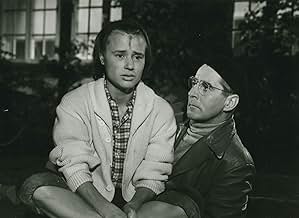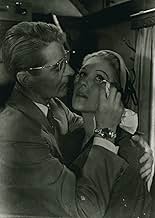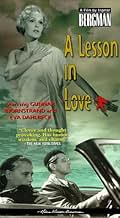CALIFICACIÓN DE IMDb
7.0/10
4 k
TU CALIFICACIÓN
Tras 15 años de matrimonio, los cónyuges van a divorciarse, pero de repente descubren que sus sentimientos aún no se han desvanecido.Tras 15 años de matrimonio, los cónyuges van a divorciarse, pero de repente descubren que sus sentimientos aún no se han desvanecido.Tras 15 años de matrimonio, los cónyuges van a divorciarse, pero de repente descubren que sus sentimientos aún no se han desvanecido.
Birgitte Reimer
- Lise
- (as Birgitte Reimers)
Georg Adelly
- Bartender
- (sin créditos)
Ingmar Bergman
- Narrator
- (sin créditos)
- …
Julie Bernby
- Guest at Wedding
- (sin créditos)
Henning Blanck
- Guest at Wedding
- (sin créditos)
Tor Borong
- Gentleman
- (sin créditos)
Yvonne Brosset
- Dancer in Bar
- (sin créditos)
Olle Ekbladh
- Guest at Wedding
- (sin créditos)
- Dirección
- Guionista
- Todo el elenco y el equipo
- Producción, taquilla y más en IMDbPro
Opiniones destacadas
The theme of "A lesson in love" is more or less the same as the theme of the "Pina Colada" song of Rupert Holmes (1979). A man and a woman have written off their marriage after 15 years and are both hunting for a new partner. During the hunt they rediscover each other.
As the theme already indicates the film has two types of scenes.
Scenes with respect to the worn out marriage (tragedy).
Scenes with both spouses (but primarily the man) on partner hunt (comedy).
As Bergman says at the beginning of the film: "This is a comedy that could have been a tragedy".
To be honest, the comedy element of this film is rather bad. It is old fashioned, over the top and maybe both. Only a year later Bergman would prove that he knows how to handle a comedy with "Smiles of a summernight" (1955).
With respect to the theme of the film the low quality if the comic scenes proves to be a blessing in disguise. Despite all the fights the family scenes are more sincere and even more hopeful than the flirtation scenes. After all to argue with someone means that you care for someone.
By the way, the real lesson in love is given by the grandparents. They show how to live with the imperfections of your partner without hurting his / her feelings or self esteem. They do so already 50 years.
As the theme already indicates the film has two types of scenes.
Scenes with respect to the worn out marriage (tragedy).
Scenes with both spouses (but primarily the man) on partner hunt (comedy).
As Bergman says at the beginning of the film: "This is a comedy that could have been a tragedy".
To be honest, the comedy element of this film is rather bad. It is old fashioned, over the top and maybe both. Only a year later Bergman would prove that he knows how to handle a comedy with "Smiles of a summernight" (1955).
With respect to the theme of the film the low quality if the comic scenes proves to be a blessing in disguise. Despite all the fights the family scenes are more sincere and even more hopeful than the flirtation scenes. After all to argue with someone means that you care for someone.
By the way, the real lesson in love is given by the grandparents. They show how to live with the imperfections of your partner without hurting his / her feelings or self esteem. They do so already 50 years.
Bergman really liked this reflecting back on summer thing, huh?
After Summer Interlude, Summer with Monika, and Wild Strawberries, it's a well he obviously found some merit in. Here we see it again in a story of a husband and wife taking a train to Malmo, Sweden (and then on to Copenhagen on a ferry) as they reflect back on their marriage.
Tonally, the movie has much more in common with Smiles of a Summer Night than the other three. It's a farce, through and through, and it's rather delightful. However, it's not really Bergman's strength, so while he makes the film entertaining and quite funny at times, he can't commit as fully to the concept as he might like. His instinct tend more towards darker ruminations, which ends up creating some tonal shifts that don't really help the movie at times.
And yet, the movie is still, largely, quite entertaining.
We begin with the dissolution of an affair between David and his lover, the much young Susanne. He's concerned that he's going to lose his family and that his wife will divorce him. The fight ranges from comic to very serious and ends with Susanne unhappily dumped. David, a gynecologist, skips out the rest of his day to catch a train. There he meets a man and a woman. The man, a salesman, bets David that he can kiss the woman before the next stop. After he gets a good slap, we remain with David and the woman and slowly realize through their bit of foreplay that the woman is David's wife, Marianne.
They go back and forth about whether their mutual affairs will continue and whether Marianne will divorce him or not. All through this, the two reflect back on different stages of their marriage, including memories around their children and his father. The memories move from extremely bitter (when Marianne discovered David and Susanne in a hotel together) to their happiest (just the mere summer before when they celebrated David's father's 73rd birthday together). As they spend time together, their memories become warmer towards each other.
The movie ends with a purely farcical display of David igniting Marianne's jealousy in a dingy bar by kissing a strange women (heavily implied to be a prostitute). A slap fight ensues and David drags her out. We see a really funny long shot as the two comically walk up and down a street, each trying to wrangle the other in their own ways. The very last shot is a cheeky moment as a cupid walks up to their hotel room and leaves a sign on the door that repeats the movie's title.
The movie really is quite amusing from beginning to end, but again, the tonal shifts that occur don't help the movie out. It's far from Bergman's best, but it really is quite delightful.
After Summer Interlude, Summer with Monika, and Wild Strawberries, it's a well he obviously found some merit in. Here we see it again in a story of a husband and wife taking a train to Malmo, Sweden (and then on to Copenhagen on a ferry) as they reflect back on their marriage.
Tonally, the movie has much more in common with Smiles of a Summer Night than the other three. It's a farce, through and through, and it's rather delightful. However, it's not really Bergman's strength, so while he makes the film entertaining and quite funny at times, he can't commit as fully to the concept as he might like. His instinct tend more towards darker ruminations, which ends up creating some tonal shifts that don't really help the movie at times.
And yet, the movie is still, largely, quite entertaining.
We begin with the dissolution of an affair between David and his lover, the much young Susanne. He's concerned that he's going to lose his family and that his wife will divorce him. The fight ranges from comic to very serious and ends with Susanne unhappily dumped. David, a gynecologist, skips out the rest of his day to catch a train. There he meets a man and a woman. The man, a salesman, bets David that he can kiss the woman before the next stop. After he gets a good slap, we remain with David and the woman and slowly realize through their bit of foreplay that the woman is David's wife, Marianne.
They go back and forth about whether their mutual affairs will continue and whether Marianne will divorce him or not. All through this, the two reflect back on different stages of their marriage, including memories around their children and his father. The memories move from extremely bitter (when Marianne discovered David and Susanne in a hotel together) to their happiest (just the mere summer before when they celebrated David's father's 73rd birthday together). As they spend time together, their memories become warmer towards each other.
The movie ends with a purely farcical display of David igniting Marianne's jealousy in a dingy bar by kissing a strange women (heavily implied to be a prostitute). A slap fight ensues and David drags her out. We see a really funny long shot as the two comically walk up and down a street, each trying to wrangle the other in their own ways. The very last shot is a cheeky moment as a cupid walks up to their hotel room and leaves a sign on the door that repeats the movie's title.
The movie really is quite amusing from beginning to end, but again, the tonal shifts that occur don't help the movie out. It's far from Bergman's best, but it really is quite delightful.
As time escapes before our eyes, the gulf from partners easily prised, distractions from all sides empower, the scent of meadow's other flowers. The grass is always greener there, far more lush to sup, devour, but once you've stepped over the stile, can you return, to reconcile.
David attempts to recover a lost link with his wife Marianne as their relationship has floundered and that link has disappeared, in not the best piece of storytelling from the maestro, although Eva Dahlbeck is always worth devouring wherever she performs and whatever she is in, and Gunnar Björnstrand was never too shabby either.
David attempts to recover a lost link with his wife Marianne as their relationship has floundered and that link has disappeared, in not the best piece of storytelling from the maestro, although Eva Dahlbeck is always worth devouring wherever she performs and whatever she is in, and Gunnar Björnstrand was never too shabby either.
Ingmar Bergman has many several superb movies. A Lesson In Love is not one of his best, or one of my favourites shall I say, but I found it to be a fine and very overlooked film in many ways. It looks wonderful, the cinematography is especially good in the picnic scene and the scenery and images are all stunning to watch. The script is cynical, charming and funny at the same time, while the story is lighter in tone than most Bergman but is well balanced also with intelligently explored issues within the family especially the tension between David and Nix. The flashbacks are very carefully calculated, and there are some standout scenes, like at the picnic, on the train and with the granddad. Bergman as ever directs superbly. It is the performances that make A Lesson in Love the charmer it is, aside from the writing that is. The ever elegant Eva Dahlbeck and Gunnar Bjornstrand give superb performances that gives A Lesson in Love that extra sparkle. Fellow Bergman regular Harriet Anderssen is also impressive, though went onto even better things. Overall, a charming and funny film, definitely recommended. 9/10 Bethany Cox
Bergman and comedy don't quite go together. Some of his comedies are so naff you almost wince. This film has the odd naff moment - the last 30 seconds being the nadir, but on the whole this is a charming (rather than funny) piece, enjoyable throughout. Bergman casts several of his usual suspects who perform well. There is a great scene on the train between David, Marianne and an uncouth salesman which will stick in the memory. Some of the marriage material is typical, cynical Bergman, but this is Bergman in a light rather than dark mood.
This film has its moments and is worth the 90-odd minutes. Not one of his classics and not the place to start if you want to fall for Bergman.
This film has its moments and is worth the 90-odd minutes. Not one of his classics and not the place to start if you want to fall for Bergman.
¿Sabías que…?
- TriviaCameo: When the doctor (Gunnar Björnstrand) enters the train a tall lean man in a beret reading a newspaper is standing in the doorway. This is no one less than Ingmar Bergman himself.
- ErroresDuring the conversation between David and his wife by the microscope, the shadow of the microphone can be seen on the wall for a large part of the scene.
- ConexionesFeatured in Stjärnbilder (1996)
Selecciones populares
Inicia sesión para calificar y agrega a la lista de videos para obtener recomendaciones personalizadas
- How long is A Lesson in Love?Con tecnología de Alexa
Detalles
- Tiempo de ejecución
- 1h 36min(96 min)
- Color
- Mezcla de sonido
- Relación de aspecto
- 1.37 : 1
Contribuir a esta página
Sugiere una edición o agrega el contenido que falta































